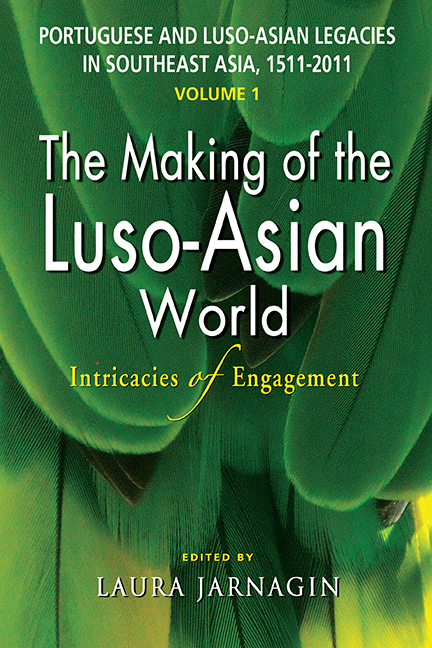 Portuguese and Luso-Asian Legacies in Southeast Asia, 1511–2011, vol. 1
Portuguese and Luso-Asian Legacies in Southeast Asia, 1511–2011, vol. 1 Book contents
- Frontmatter
- Contents
- List of Charts, Figures and Tables
- A Tribute to Glenn Ames
- Preface
- List of Contributors
- Glossary
- Introduction: Towards Clarity through Complexity
- Part One Adaptations and Transitions in the South and Southeast Asian Theatres, Sixteenth through Eighteenth Centuries
- Part Two Dispersion, Mobility and Demography from the Sixteenth into the Twenty-first Centuries
- Part Three Mixed Legacies: The Portuguese and Luso-Asians in the Twentieth and Twenty-first Centuries
- Bibliography
- Index
A Tribute to Glenn Ames
Published online by Cambridge University Press: 21 October 2015
- Frontmatter
- Contents
- List of Charts, Figures and Tables
- A Tribute to Glenn Ames
- Preface
- List of Contributors
- Glossary
- Introduction: Towards Clarity through Complexity
- Part One Adaptations and Transitions in the South and Southeast Asian Theatres, Sixteenth through Eighteenth Centuries
- Part Two Dispersion, Mobility and Demography from the Sixteenth into the Twenty-first Centuries
- Part Three Mixed Legacies: The Portuguese and Luso-Asians in the Twentieth and Twenty-first Centuries
- Bibliography
- Index
Summary
Professor Glenn Ames of the University of Toledo had planned to attend the “Portuguese and Luso-Asian Legacies in Southeast Asia, 1511–2011” conference in Singapore and Malacca in late September 2010. Many of us, his long-time colleagues, were looking forward to seeing him again, and to hearing his scheduled contribution, a paper entitled “A Tale of Two Cities: The Creation and Role of ‘Creole’ Power Groups in Goa and Malacca, circa 1510–1683”. Because Glenn had not burdened us with the knowledge, we were unaware that he was ill; so, it was puzzling — and very unlike Glenn — when he simply did not appear. Two weeks later, his friends were shocked to learn the true reason behind his absence: Glenn Ames passed away on 14 October 2010, after struggling for months against a relapse of melanoma cancer. He was fifty-five years old.
In his relatively brief career, Glenn Ames distinguished himself as a leading scholar of the Lusophone world and European expansion in Asia. It is therefore particularly fitting that the conference participants and organizers have decided to dedicate this publication to his memory as an historian and friend.
Glenn earned his Ph.D. in history from the University of Minnesota in 1987; his concentration fields were early modern Europe, French history and the history of European expansion. He spent a postdoctoral year at the University of Bristol (United Kingdom) as a Leverhulme Fellow. For twenty-two years, he was a member of the history faculty at the University of Toledo (USA). Glenn accumulated many academic awards and honours over the years, including a Fulbright grant and fellowships from the American Institute of Indian Studies, the Portuguese Ministry of Education and the Calouste Gulbenkian Foundation of Lisbon. In 2002, he was a Union Pacific Visiting Professor at the Center for Early Modern Europe at the University of Minnesota.
A keen and assiduous archival researcher, Glenn had worked on documentary collections in France, England, the Netherlands, Portugal and India, often for very extended periods of time. He was also a prolific author, with some six books to his credit, numerous journal articles and book chapters in edited volumes.
- Type
- Chapter
- Information
- Portuguese and Luso-Asian Legacies in Southeast Asia, 1511–2011, vol. 1The Making of the Luso-Asian World: Intricacies of Engagement, pp. xi - xivPublisher: ISEAS–Yusof Ishak InstitutePrint publication year: 2011
